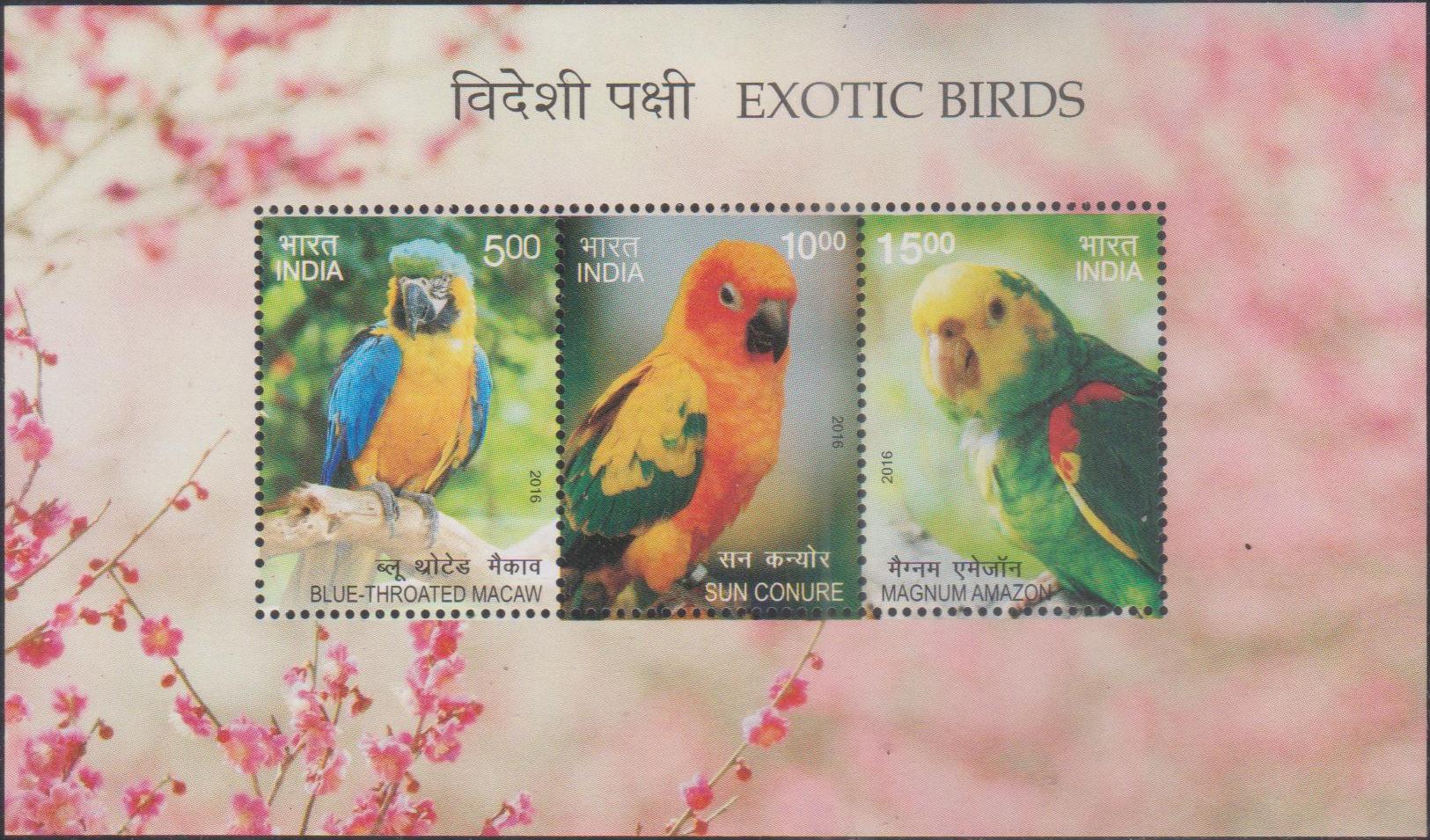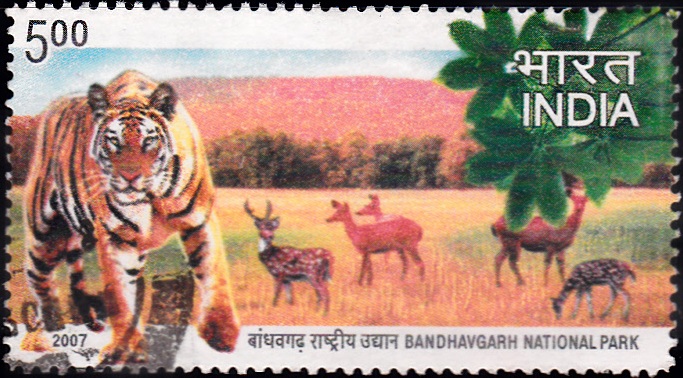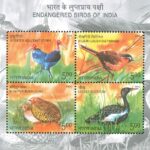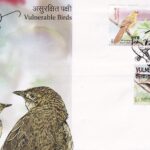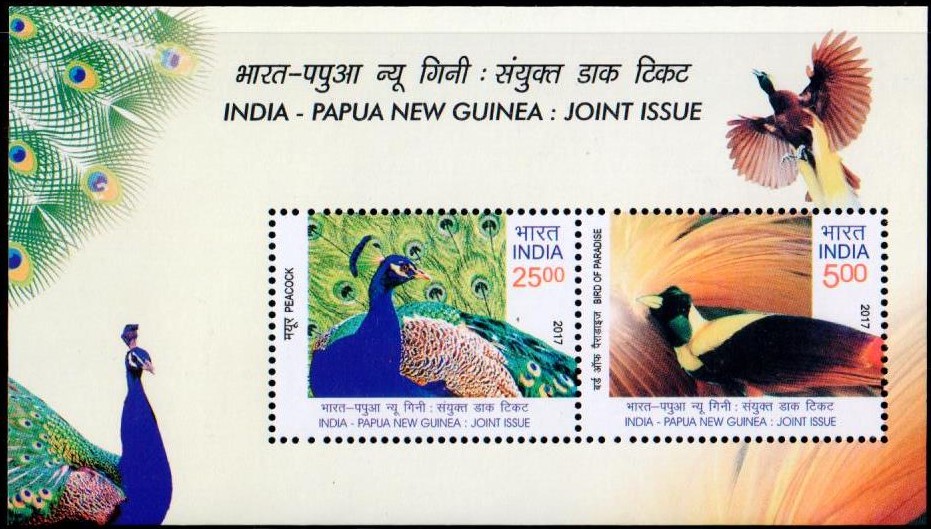
India-Papua New Guinea : Joint Issue
Complete set of 2 nos. of commemorative postage stamps on the National Birds : Peacock from India and Raggiana Bird of Paradise from Papua New Guinea :


 Issued by India
Issued by India
Issued on Dec 30, 2017
Issued for : Department of Posts is pleased to release a set of two Commemorative Postage Stamps on theme of National Birds of India and Papua New Guinea featuring ‘Peacock’ of India and ‘Raggiana bird-of-paradise’ of Papua New Guinea.
Credits :
Stamp/Miniature Sheet/First Day Cover/Brochure/Cancellation Cachet : Smt. Alka Sharma
Type : Miniature Sheet, Mint Condition
Colour : Multi Colour
Denomination : 2500 & 500 Paise
Stamps Printed : 2.1 Lakh each
Miniature Sheet Printed : 1.1 Lakh
Printing Process : Wet Offset
Printer : Security Printing Press, Hyderabad
About :
- The Diplomatic relations between India and Papua New Guinea (PNG) were established when Indian resident Mission was opened in Port Moresby in 1996. PNG opened its resident Mission in New Delhi in 2006. India and PNG are commonwealth countries and enjoy warm and cordial relations.
- India and Papua New Guinea actively interact through different platforms that allow both countries to exchange views on many issues of common concerns. The cooperation covers multiple areas in economic, Industrial & commercial, science & Technology, Education and Cultural.
- With the significance of the bilateral relation between India and Papua New Guinea, the both Postal Administrations, in agreement, cooperated and jointly released this stamp issue featuring their respective national birds (The Peacock representing India and the Raggiana Bird of Paradise representing Papua New Guinea).
- Peacock:
- The Peacock, Pavo cristatus (Linnaeus), is the National Bird of India. It is a symbol of grace, joy, beauty and love. Peacock is a large and majestic bird. Peacock is a colorful, swan-sized bird with a fan-shaped crest of feathers on its head, a white patch under the eye and a long-slender neck.
- The male of the species is more colorful than the female with a glistening blue breast and neck and a spectacular bronze-green tail of around 200 elongated feathers. The female is called Peahen and it is brownish, slightly smaller than the male and lacks the tail. The peahen lays 3-5 eggs at a time in a hole of the trunk of a tree or in a bush. They sometimes dig small holes in the soil with their legs to lay eggs. Peacock occupies a respectable position in Indian culture and is protected under the Indian Wildlife (Protection) Act, 1972.
- Peacock is a hard bird. It has unique adaptability to extreme climatic conditions. Thus, it can live in the hot, dry desert region of Rajasthan as well as it can adjust nicely with colder climates of Europe and America. Generally, peacock likes to live in the bushes or jungles near a permanent water source. They cannot fly much but can run fast on their strong legs. Their wings are not strong enough for flying.
- Peacock, known as “Mayur” in Sanskrit and Hindi and also known as “Mor”, finds description in popular art forms, songs, drama, dance, murals, sculptures and other forms of folk and traditional art. Lord Krishna is known to have an affinity for peacock feather as he used it to adorn his head. Peacock is also shown as the “Vahana” or vehicle of Lord Murugan or Kartikeya, Lord Siva’s son. A dancing peacock is often associated with onset of monsoon and has been so depicted in miniature paintings and other music and art forms. The rich colors and beauteous form of the bird is a popular decorative motif in jewellery and costume making as well.
- The Raggiana Bird of Paradise:
- The Raggiana bird of paradise, (Paradisaea raggiana) is a large bird in the bird-of-paradise family Paradisaeidae.
- The Raggiana bird of paradise is known as the Kumul and in 1971 Raggiana bird of paradise was made the national emblem of Papua New Guinea, included on the national flag and is the name of Papua New Guinea’s national rugby league team, the Kumuls.
- Raggiana bird of paradise is 34 cm long, maroon-brown with a greyish-blue bill, yellow iris and greyish-brown feet. The male has a yellow crown, dark emerald-green throat and yellow collar between the throat and its blackish upper breast feathers. It is adorned with a pair of long black tail wires and large flank plumes. The female is a maroonish-brown bird with no long tail feathers. The ornamental flank plumes vary from red to orange in color, depending on subspecies.
- Its diet consists mainly of fruits and arthropods. The species is an important seed disperser of some fruiting trees in New Guinea, and is for some species of mahogany and nutmeg the main fruit disperser.
- The breeding system of the Raggiana bird-of-paradise is polygamy. Males congregate in leks (display arenas for visiting females). Leks can be 30-100 meters in diameter. The nest is a bowl-shaped structure composed of leaves and leaf pieces, stems, ferns and other plant fibres. It is lined with horsehair-like material and is situated 2-11 m above the ground on tree branches.
- Text : Based on the material available on internet.


